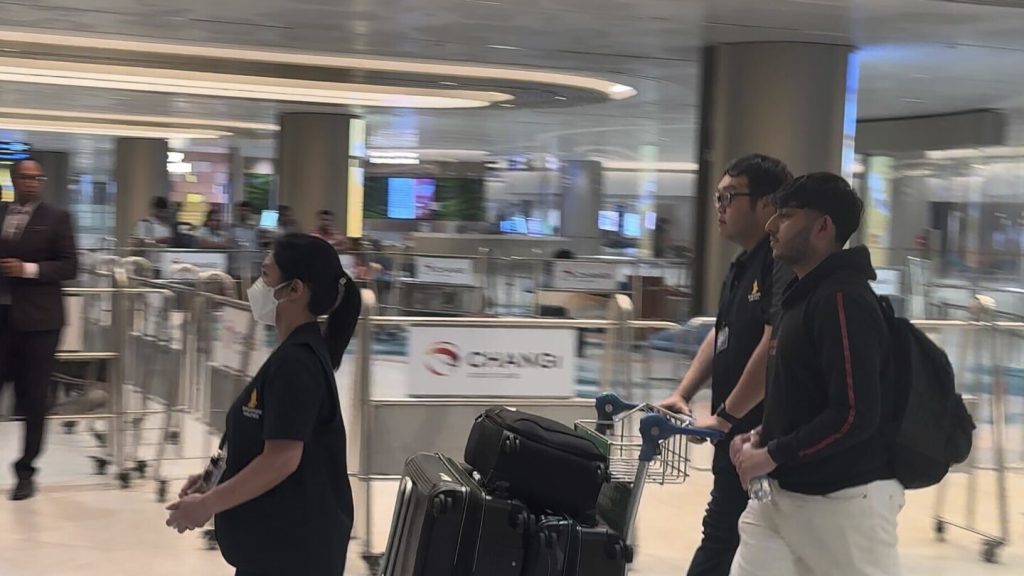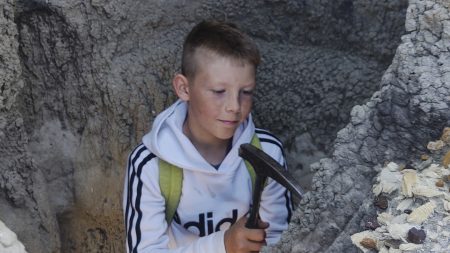Summarize this content to 2000 words in 6 paragraphs in Arabic
BANGKOK (AP) — Singapore Airlines said a relief plane flew into Singapore early Wednesday morning with most of the passengers who were on a flight that was battered by severe turbulence over the Indian Ocean and had to make an emergency landing in Bangkok after one man died and dozens of people were injured.The airline said 143 passengers arrived in the city state shortly after 5 a.m.The airline’s CEO, Goh Choon Phong, said an additional 79 passengers and six crew members remained in Bangkok, including the 71 hospitalized as of Wednesday morning. The airline told The Associated Press that a second relief flight was planned.The airline’s Flight SQ321 was flying from London’s Heathrow airport to Singapore, with 211 passengers and 18 crew members aboard, when it hit the turbulence Tuesday, bashing people around inside the plane. The Boeing 777 descended 6,000 feet (around 1,800 meters) in about three minutes, the carrier said Tuesday.
“We are very sorry for the traumatic experience that everyone on board SQ321 went through,” Goh said in a video on social media. He said the airline was providing all necessary support and pledged it would fully cooperate in investigations.
An airport official said the 73-year-old British man who died might have had a heart attack, though that hadn’t been confirmed. Thai officials withheld the man’s name, but British media identified him as Geoff Kitchen, who was going on a holiday with his wife. She was among the passengers taken to hospital in Bangkok
Kitchen was described as formerly working in the insurance industry, and in retirement continuing his involvement with amateur theater.The Thornbury Musical Theatre Group, with which he worked, said he was “always a gentleman with the utmost honesty and integrity and always did what was right for the group.”Passengers who arrived at Singapore’s Changi Airport on Wednesday were greeted by Goh and their family members, some with tears of joy and relief. They were escorted out and didn’t talk to the media.
Officials from the British and Malaysian embassies in Bangkok visited Samitivej Srinakarin Hospital on Wednesday to check on the injured. British officials were taken to the ninth floor, which hosts the hospital’s intensive care unit along with pediatric surgery and bone marrow transplant wards. Hospital officials said 61 of the injured were being treated there and 10 had been transferred to other hospitals in its network. Malaysia’s Foreign Ministry said nine of that country’s citizens, including a crew member, were being treated at Samitivej Srinakarin Hospital and three at Samitivej Sukhumvit Hospital. “According to both hospitals, all of them suffered physical and internal injuries, with one person in critical but stable condition,” it said in a statement.Recounting the accident, British passenger Andrew Davies told Sky News that the seatbelt sign was illuminated but crew members didn’t have time to take their seats.“Every single cabin crew person I saw was injured in some way or another, maybe with a gash on their head,” Davies said. “One had a bad back, who was in obvious pain.”
Dzafran Azmir, a 28-year-old student on the flight, told ABC News: “Some people hit their heads on the baggage cabins overhead and dented it. They hit the places where lights and masks are and broke straight through it.”Kittipong Kittikachorn, general manager of Suvarnabhumi Airport, said the sudden descent occurred as passengers were being served food. He said at least seven passengers were severely injured. The British man appeared to have had a heart attack but medical authorities would need to confirm that, he said.Tracking data captured by FlightRadar24 and analyzed by The Associated Press show the Singapore Airlines flight SQ321 cruising at an altitude of 37,000 feet (11,300 meters).At one point, the Boeing 777-300ER suddenly and sharply descended to 31,000 feet (9,400 meters) over about three minutes, according to the data. The aircraft then stayed at 31,000 feet (9,400 meters) for under 10 minutes before diverting and landing in Bangkok less than a half-hour later.
Most people associate turbulence with heavy storms, but the most dangerous type is so-called clear air turbulence. Wind shear can occur in wispy cirrus clouds or even in clear air near thunderstorms, as differences in temperature and pressure create powerful currents of fast-moving air.According to a 2021 report by the U.S. National Transportation Safety Board, turbulence accounted for 37.6% of all accidents on larger commercial airlines between 2009 and 2018. The Federal Aviation Administration, another U.S. government agency, has said there were 146 serious injuries from turbulence from 2009 to 2021.Boeing extended condolences to the family of the dead man and said it was in contact with Singapore Airlines “and stand ready to support them.”
The wide-body Boeing 777 is a workhorse of the aviation industry, used mainly for long-haul flights by airlines around the world. The 777-300ER variant of the twin-engine, two-aisle plane is larger and can carry more passengers than earlier models.Singapore Airlines, the city-state’s flag carrier, operates 22 of the aircraft as part of its fleet of more than 140 planes. The airline’s parent company is majority owned by Singapore’s Temasek government investment conglomerate and also operates the budget airline Scoot.Singapore Airlines said the nationalities of the passengers were 56 Australians, two Canadians, one German, three Indians, two Indonesians, one Icelander, four Irish, one Israeli, 16 Malaysians, two from Myanmar, 23 New Zealanders, five Filipinos, 41 from Singapore, one South Korean, two Spaniards, 47 from the United Kingdom and four from the United States.___Associated Press writer Eileen Ng in Kuala Lumpur, Malaysia, contributed to this report.
window.fbAsyncInit = function() {
FB.init({
appId : ‘870613919693099’,
xfbml : true,
version : ‘v2.9’
});
};
(function(d, s, id){
var js, fjs = d.getElementsByTagName(s)[0];
if (d.getElementById(id)) {return;}
js = d.createElement(s); js.id = id;
js.src = “https://connect.facebook.net/en_US/sdk.js”;
fjs.parentNode.insertBefore(js, fjs);
}(document, ‘script’, ‘facebook-jssdk’));















